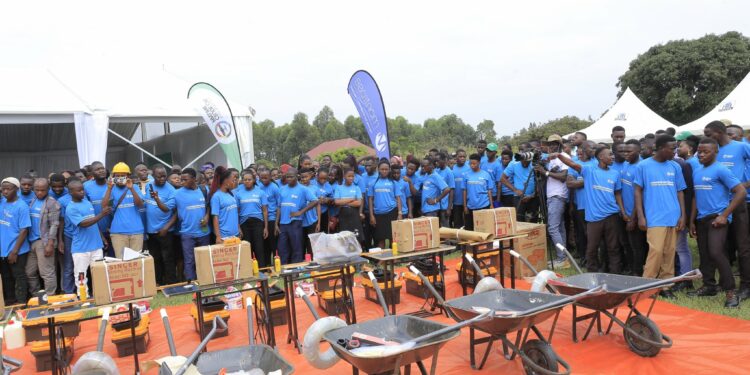A total of 754 Project Affected Persons (PAPs) from communities impacted by the East African Crude Oil Pipeline (EACOP) project have successfully completed a three-month vocational training program aimed at restoring their livelihoods and fostering economic independence.
The initiative, part of the broader EACOP livelihood restoration strategy, focuses on empowering individuals from the districts of Kikuube, Kakumiro, Mubende, Kyankwanzi, and Hoima, through skill development in various trades.
The training program offered courses in a diverse range of practical fields, including motor vehicle mechanics, hairdressing, welding, plumbing, carpentry, electric installation, tailoring, and more. The objective of the program is to equip the participants with marketable skills that can enable them to rebuild their lives and sustain their families after being displaced by the pipeline construction.
Training was conducted at several reputable institutions such as Buhimba Vocational Training Institute, St. Simon Peter’s Vocational Training Institute, and Millennium Business School. These institutions provided hands-on learning experiences, giving the participants valuable exposure to the skills they would need to pursue successful careers or establish their own businesses.
Eileen Baguma, EACOP’s Director of Human Resources and Corporate Affairs, spoke at the graduation ceremony, which marked the completion of the program. She represented EACOP’s Managing Director, Guillaume Dolout, and took the opportunity to emphasize the significance of the program.
“By providing you with these skills, we hope to empower you to either start your own business or engage in income-generating activities that will have a lasting impact on your households and communities,” Baguma remarked.
As part of the initiative, each graduate received a certificate of completion along with a startup kit, containing essential tools and materials designed to help them establish their own enterprises or embark on productive activities. The kits, which are a vital resource for the new entrepreneurs, will enable the beneficiaries to jump-start their careers and begin generating income to support their families.
“The startup kits are an integral part of this program, as they provide the necessary tools to help you get back on your feet and become self-sufficient,” Baguma added, highlighting the program’s focus on long-term economic empowerment.
The ceremony also featured speeches from several key stakeholders. Samuel Mugisa from the Petroleum Authority of Uganda (PAU) highlighted the importance of putting the skills learned into practical use. He urged the graduates to take responsibility for the tools provided and use them to enhance their livelihoods. Mugisa stressed that the success of the program would ultimately depend on how the skills and resources were applied to create sustainable economic opportunities.
Kakumiro’s Resident District Commissioner (RDC), David Matovu, commended the program’s focus on youth empowerment, noting that vocational training was a powerful tool in addressing employment challenges in rural areas. He emphasized that with the right skills, young people could overcome barriers to employment and become active contributors to their communities’ economic growth.
For many of the graduates, the program has already begun to open new doors. Miriam Atuhaire, a graduate from Kikuube, expressed gratitude for the skills she acquired, saying they would enable her to become financially independent and support her family. Nickson Wekisa, another beneficiary, noted that the skills would provide him with the opportunity to earn a stable income, even without relying on formal employment.
The EACOP pipeline, which spans 1,443 kilometers from Hoima, Uganda, to Tanga Port in Tanzania, is a major infrastructure project valued at $5 billion. The pipeline is jointly owned by TotalEnergies (62%), CNOOC Uganda (8%), the Tanzania Petroleum Development Corporation (15%), and the Uganda National Oil Company. The construction is being carried out by a joint venture between China Petroleum Pipeline Engineering Co. Ltd and Worley Limited. The project will feature six pump stations, two pressure reduction stations, and a marine export terminal in Tanzania.
As the project continues, the EACOP team remains committed to supporting the communities affected by the pipeline, with the vocational training program serving as just one example of its broader efforts to foster sustainable development and enhance the well-being of local populations.
Do you have a story in your community or an opinion to share with us: Email us at editorial@watchdoguganda.com













